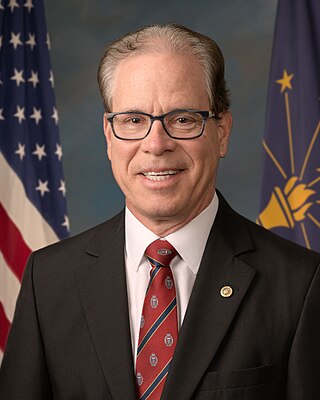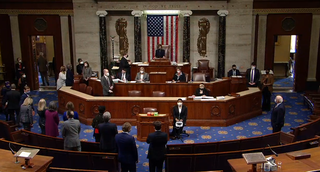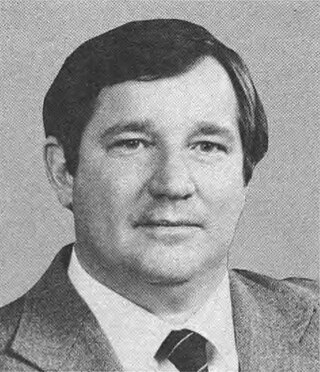
The United States Capitol Police (USCP) is a federal law enforcement agency in the United States with nationwide jurisdiction charged with protecting the United States Congress within the District of Columbia and throughout the United States and its territories. It answers to the Capitol Police Board and is the only full-service federal law enforcement agency appointed by the legislative branch of the federal government of the United States.
Dr. David Paul Weber is an American criminalist, and the former Assistant Inspector General for Investigations at the U.S. Securities and Exchange Commission (SEC). He is the Principal Investigator of a $2.6 million grant by the U.S. Department of Health and Human Services, to test various white collar crime interventions concerning elder financial exploitation and high-tech crime. He is a Professor of the Practice in Fraud and Forensic Accounting at the Perdue School of Business, Salisbury University. In the past, Dr. Weber was a whistleblower who reported allegations about foreign espionage against the stock exchanges, and misconduct in the Bernard L. Madoff and R. Allen Stanford Ponzi scheme investigations. In June 2013, the SEC settled with Weber his whistleblower protection and U.S. District Court lawsuits, paying him one of the largest federal employee whistleblower settlements ever. In 2014, In Bed with Wall Street author Larry Doyle named Dr. Weber as one of his "top 5 whistleblowers". On July 30, 2015, Weber was recognized by six United States Senators and one member of the House of Representatives at the First Congressional Celebration of National Whistleblower Appreciation Day. On August 5, 2021, Dr. Weber met with the President, Speaker of the House, and Senators at the signing of H.R. 3325, the awarding of the Congressional Gold Medal for those officers who lost their lives at the Capitol Insurrection, as he represents one of the deceased police officers and his widow. Ultimately, he was successful in having his client Police Officer Jeffrey L. Smith designated as having died in the line of duty by the District of Columbia in March 2022, and in August 2023 by the U.S. Department of Justice. Dr. Weber is now a forensic accounting professor at the Perdue School, Salisbury University. As part of his teaching duties, he is a special investigator for the Maryland State's Attorneys Offices in two adjoining counties, and a Virginia financial crimes state prosecutor in the neighboring Virginia county. He supervises his students who act as intern investigators on financial crime cases.

Michael Kent Braun is an American businessman and politician serving as the junior United States senator from Indiana since 2019. A member of the Republican Party, he previously represented the 63rd district in the Indiana House of Representatives from 2014 to 2017. Braun was elected to the United States Senate in 2018, defeating Democratic incumbent Joe Donnelly.
This section of the timeline of United States history includes major events from 2010 to the present.
2020s in United States political history is a narrative summary of major political events and issues in the United States from January 1, 2020, through December 31, 2029. The first part is divided chronologically by Congressional sessions and the second part highlights major issues that span several years or even the entire decade. There are links for further information.

Protests began in multiple cities in the United States following the 2020 United States presidential election between then-President Donald Trump and Democratic Party challenger Vice President Joe Biden, held on November 3, 2020. Biden won the election, receiving 81.3 million votes (51.3%) to Trump's 74.2 million (46.9%) and winning the Electoral College by 306 to 232. Biden's victory became clear on November 7, after the ballots had been tabulated. The Electoral College voted on December 14, in accordance with law, formalizing Biden's victory.

On January 6, 2021, the United States Capitol Building in Washington, D.C., was attacked by a mob of supporters of then-U.S. president Donald Trump, two months after his defeat in the 2020 presidential election. They sought to keep Trump in power by occupying the Capitol and preventing a joint session of Congress counting the Electoral College votes to formalize the victory of President-elect Joe Biden. The attack was ultimately unsuccessful in preventing the certification of the election results. According to the House select committee investigating the incident, the attack was the culmination of a seven-part plan by Trump to overturn the election.

Donald Trump, the 45th president of the United States, was impeached for the second time on January 13, 2021, one week before his term expired. It was the fourth impeachment of a U.S. president, and the second for Trump after his first impeachment in December 2019. Ten Republican representatives voted for the second impeachment, the most pro-impeachment votes ever from a president's party. This was also the first presidential impeachment in which the majority caucus voted unanimously for impeachment. Trump was indicted on August 1, 2023, for the conduct for which he was impeached.

On January 6, 2021, Ashli Babbitt was fatally shot during an attack on the United States Capitol. She was part of a crowd of supporters of then U.S. president Donald Trump who breached the United States Capitol building seeking to overturn his defeat in the 2020 presidential election.

On January 7, 2021, a United States Capitol Police (USCP) officer, Brian Sicknick, died after suffering two strokes the day after he responded to an attack on the U.S. Capitol. The District of Columbia chief medical examiner found that Sicknick had died from stroke, classifying his death as natural and additionally commented that "all that transpired played a role in his condition", a decision which was criticized by some expert neurologists, who have stated that stress from the attack may have very well caused the stroke. His cremated remains were laid in honor in the Capitol Rotunda on February 2, 2021, before they were buried with full honors at Arlington National Cemetery.

The following article is a broad timeline of the course of events surrounding the attack on the United States Capitol on January 6, 2021, by rioters supporting United States President Donald Trump's attempts to overturn his defeat in the 2020 presidential election. Pro-Trump rioters stormed the United States Capitol after assembling on the Ellipse of the Capitol complex for a rally headlined as the "Save America March".

The second impeachment trial of Donald Trump, the 45th president of the United States, began on February 9, 2021, and concluded with his acquittal on February 13. Donald Trump had been impeached for the second time by the House of Representatives on January 13, 2021. The House adopted one article of impeachment against Trump: incitement of insurrection. He is the only U.S. president and only federal official to be impeached twice. He was impeached by the House seven days prior to the expiration of his term and the inauguration of Joe Biden. Because he left office before the trial, this was the first impeachment trial of a former president. The article of impeachment addressed Trump's attempts to overturn the 2020 presidential election results and stated that Trump incited the attack on the Capitol in Washington, D.C., while Congress was convened to count the electoral votes and certify the victory of Joe Biden and Kamala Harris.

Howard Scholer Liebengood was an American lawyer and lobbyist. A protégé of Senator Howard Baker, he served as Sergeant at Arms of the United States Senate from 1981 to 1983 before leaving to become a lobbyist for the Tobacco Institute. He later served as chief of staff to Senators Fred Thompson and Bill Frist.

In the aftermath of the January 6 United States Capitol attack, after drawing widespread condemnation from the U.S. Congress, members of his administration, and the media, 45th U.S. President Donald Trump released a video-taped statement on January 7 to stop the resignations of his staff and the threats of impeachment or removal from office. In the statement, he condemned the violence at the U.S. Capitol, saying that "a new administration will be inaugurated", which was widely seen as a concession, and his "focus now turns to ensuring a smooth, orderly, and seamless transition of power" to the Joe Biden administration. Vanity Fair reported that Trump was at least partially convinced to make the statement by U.S. Senator Lindsey Graham (R-SC), who told Trump a sufficient number of Senate Republicans would support removing him from office unless he conceded. Kayleigh McEnany, the White House Press Secretary, had attempted to distance the administration from the rioters' behavior in a televised statement earlier in the day. On January 9, The New York Times reported that Trump had told White House aides he regretted committing to an orderly transition of power and would never resign from office. In a March 25 interview on Fox News, Trump defended the Capitol attackers, saying they were patriots who posed "zero threat", and he criticized law enforcement for "persecuting" the rioters.

The January 6 United States Capitol attack was followed by political, legal, and social repercussions. The second impeachment of Donald Trump, who was charged for incitement of insurrection for his conduct, occurred on January 13. At the same time, Cabinet officials were pressured to invoke the 25th Amendment for removing Trump from office. Trump was subsequently acquitted in the Senate trial, which was held in February after Trump had already left office. The result was a 57–43 vote in favor of conviction, with every Democrat and seven Republicans voting to convict, but two-thirds of the Senate are required to convict. Many in the Trump administration resigned. Several large companies announced they were halting all political donations, and others have suspended funding the lawmakers who had objected to certifying Electoral College results. A bill was introduced to form an independent commission, similar to the 9/11 Commission, to investigate the events surrounding the attack; it passed the House but was blocked by Republicans in the Senate. The House then approved a House "select committee" to investigate the attack. In June, the Senate released the results of its own investigation of the attack. The event led to strong criticism of law enforcement agencies. Leading figures within the United States Capitol Police resigned. A large-scale criminal investigation was undertaken, with the Federal Bureau of Investigation (FBI) opening more than 1,200 case files. Federal law enforcement undertook a nationwide manhunt for the perpetrators, with arrests and indictments following within days. Over 890 people had been found guilty of federal crimes.

Eugene Goodman is an American United States Capitol Police officer who diverted invading rioters from the United States Senate chamber during the January 6 Capitol attack. Goodman is a U.S. Army veteran who served during the Iraq War. He served as the Acting Deputy Sergeant at Arms of the United States Senate from January 20, 2021, to March 2, 2021.

The National Commission to Investigate the January 6 Attack on the United States Capitol Complex, known colloquially as the January 6 commission, was an unsuccessful proposal to create a commission that would have investigated the January 6 United States Capitol attack. On February 15, 2021, Speaker of the United States House of Representatives Nancy Pelosi announced that she planned to create a "9/11-type commission". The details were initially negotiated by Republican John Katko, and would have consisted of an equal number of Democrats and Republicans. A bill forming the commission passed the House of Representatives on May 19, with all Democrats and 35 Republicans voting in support of it. However, it was blocked by Senate Republicans on May 28, with 54 Senators voting in favor and 35 voting against, failing to clear the 60 votes needed to break a filibuster.

The United States Capitol in Washington, D.C., became the meeting place of the United States Congress when the building was initially completed in 1800. Since that time, there have been many violent and dangerous incidents, including shootings, fistfights, bombings, poisonings and a major riot.

Law enforcement mounted a response to the January 6 United States Capitol attack, initially failing to maintain security perimeters and protect parts of the building from being breached and occupied, but succeeding at protecting members of Congress, and subsequently, as reinforcements arrived, to secure the breached Capitol.

Jeffrey L. Smith, a Washington, D.C. Metropolitan Police officer, shot himself on January 15, 2021, after he assisted the United States Capitol Police on January 6, during the response to the storming of the Capitol. A psychiatrist hired by Officer Smith's widow found that drastic changes in Smith's behavior after January 6 are evidence that the attack on the Capitol was the precipitating event leading to his suicide. On October 13, 2021, two United States Senators and several members of the House of Representatives called for the Mayor to award Line of Duty benefits to Officer Smith and his widow Erin Smith. On March 7, 2022, Officer Smith's death was officially ruled line of duty by the District of Columbia. After petition by his widow, DC Police and Firefighters' Retirement and Relief Board found that the "direct and sole" cause of Officer Smith's death were the injuries he received in the line of duty while responding to the Capitol riot on January 6, 2021.












